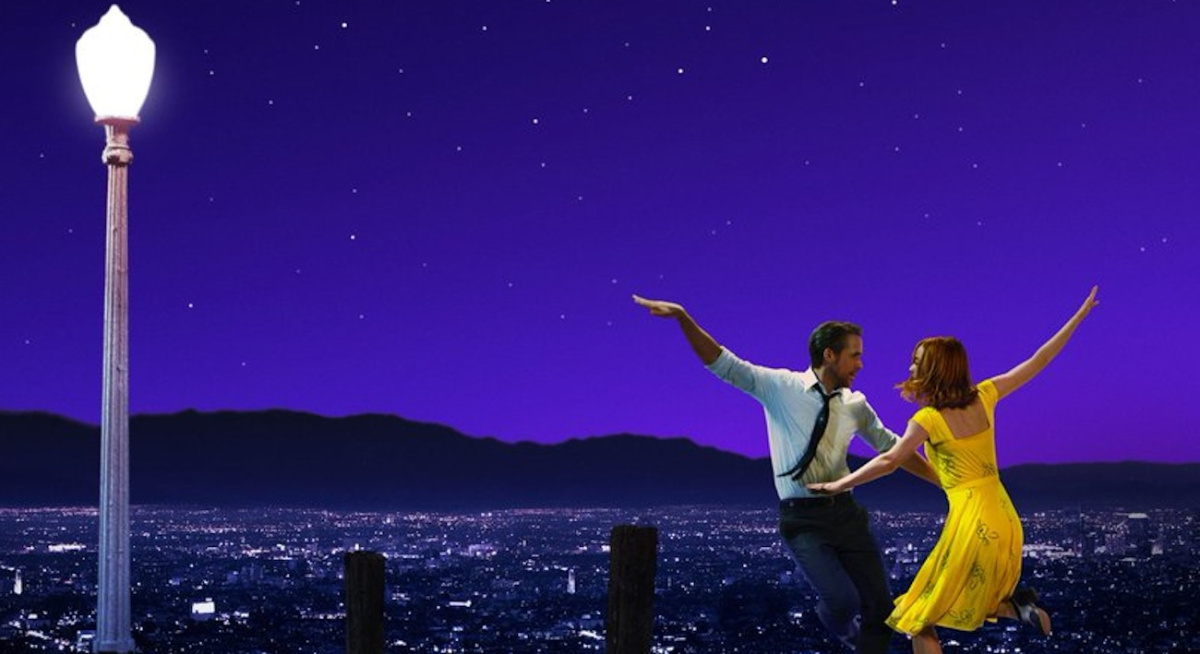Kevin Clarke
Operetta Research Center
4 January, 2017
This month, Damien Chazelle’s movie musical La La Land hits theaters in Europe. It is a must-see for anyone interested in music films and how to update an old-fashioned genre like the “Hollywood Musical of the 1950s” for our current sensitivities. It’s a question operetta directors have been battling with as well, without ever quite getting the wonderful Emma Stone and Ryan Gosling to star in an operetta production.

Ryan Gosling and Emma Stone in “La La Land.” (Photo: Lionsgate)
When operetta casting directors actually tried something comparable, back in the 1980s with Pirates of Penzance and Kevin Kline, Linda Ronstadt & Co. they landed a smash-hit, of a different sort – on stage in Central Park, on Broadway, and in Hollywood.
While this Gilbert & Sullivan resurrection was a typical example of early 80s trash (gone gloriously wild), the new ultra-stylish Chazelle product works differently. Because it finds a new way of dealing with so called “escapism” – which was a central element of MGM Hollywood musicals. Before them, operettas by Paul Abraham, Erik Charell and others also offered perfect commercially successful escapism. However, it’s a word and concept usually seen as negative by operetta researchers such as Volker Klotz who dismisses Die Blume von Hawaii (1931) exactly because of this.

Sheet music cover for Paul Abraham’s “Die Blume von Hawaii,” 1930. (Photo: Archive of the Operetta Research Center)
In an interview with Time Out Mr. Chazelle pointed to something that applies to operettas, too. He said: “Part of me would never want to make something that’s purely escapist. Yet at the same time, avoiding escapism can seem like a somewhat privileged point of view. Who am I to judge that, in the ‘30s, the greatest thing that the Fred and Ginger musicals offered was an escape from the Depression? Who am I to kind of throw shade on that aspect of what a movie can do?”
We wonder if Mr. Klotz ever asked himself this with regard to all the shows he branded as “degenerate” and “bad”?
Mr. Chazelle explains that “musicals at their best” can “offer an escape of a certain kind”. While at the same time “You’re not completely escaping into another world that has nothing to do with your own. It’s more like you’re putting on a different set of glasses to look at the world. Because musicals can, in some ways, reflect on the real world.”
Truer words have rarely been spoken.
And they apply, fully, to all those escapist operettas than have been pushed aside and ignored by Klotz and his followers. As if the escapism of Blume von Hawaii, or Dschainah, or Viktoria und ihr Husar (or Casanova or Im weißen Rössl or Der Kongress tanzt) has nothing to do with the harsh realities of the Weimar Republik. Of course it has, and seeing the reality shimmer through the escapist magic sprinkled over these operettas is the schizophrenic glory of these shows, even of the genre itself.
What you can do artistically with such schizophrenia is demonstrated to perfection in La La Land, which – in the midst of all the fantasy and unreality – suddenly touches some very deep and universal truths. The films shows us, as theater goers, how much our own longing for a happy end is part of who we are, because the brutal banality of reality can often be too depressing to accept.
If you come out of La La Land deeply moved and transported, you’re experiencing a magic that we would also expect from the new upcoming Blume von Hawaii in Dortmund. It premieres on January 21, a staging by Thomas Enzinger, conducted by Philipp Armbruster. Their production will be based on the reconstructed original score by Henning Hagedorn and Matthias Grimminger.
Instead of Emma Stone you’ll get Emily Newton as Princess Laya and instead of Gosling there’s Fritz Steinbacher as Captain Stone.

Ryan Gosling and Emma Stone in “La La Land.” (Photo: Lionsgate)
Let’s wait and see it this escape to Hawaii and the musical world of Abraham will be as overwhelming and inventive as La La Land. Or whether Enzinger will escape the possibilities of escapism, by simply ignoring them – for fear of being too simple, too kitschy, too whatever.

So it was a fork-in-the-road, a what might have been movie.
Stick with it until the end. Definitely see the Waltz in the Stars [55ish].
Have your hankie ready, because the film is about you.